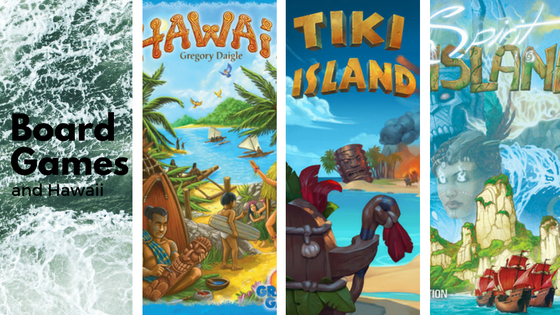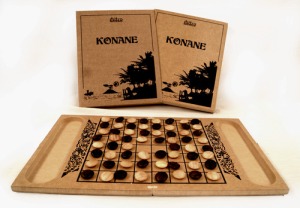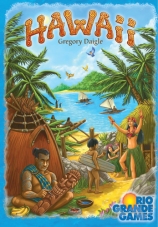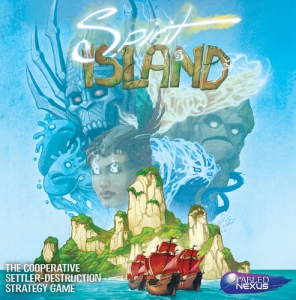
My event for Hawaiian #OwnVoices finished up at the end of November, but I still have some posts I wanted to share about Hawaii. This time it’s about board games! Thank you for reading along!!
It may be odd to think about board games and its relationship to Hawaii and Native Hawaiian peoples. You may be thinking board games do not have a lot to do with race or culture. In my own research and exploration of the hobby, I have seen a big connection. For starters, modern board gaming as a hobby was built on games from cultures and communities outside of Europe and the United States. From ancient games like Go (pre Zhou dynasty in China) to the mechanics of Mancala (East African, south Asian, and western Asian nations) to Chess (India and Persia), modern board games borrow and build off these without giving much credit to their origins. While the modern board game market is dominated by countries in Europe and the United States, gaming has proven to be a global phenomenon since ancient times all the way to today. Now as the markets have expanded and technology has increased, we are starting to see companies and designers from countries outside of Europe and the United States break into the industry.

Credit ~ BGG User: Tsukumo
Going back to cultural board games, one board game developed in Polynesian and Hawaiian culture is Konane. Konane is an abstract strategy game for two players, where players are moving their stones on a grided board. With each move players are eliminating their opponents pieces by moving their pieces over their opponent, essentially “jumping” over pieces. Once a player’s pieces are completely eliminated, the game ends, and the other player wins!
Modern board games utilize the idea of thematic experiences to take traditionally abstract games into a realm of story and storytelling. The recent Five Tribes from Days of Wonder uses a variation of Mancala that allow players to move people around the desert. Planes from AEG also uses a Mancala mechanic to move passengers through a circular airport. Many modern abstract games can trace their roots back to Go or Chess. In addition to co-opting mechanics, we have seen the use of themes appropriated from many different cultures. From the 2016 release of Waka Tanka to the 2012 release of Tzolk’in, we have seen specifically Indigenous Peoples of the Americas appropriated as theme.
 The most popular game that uses Hawaiian culture and history as a theme is a game simply by the name of Hawaii. For complete transparency, I have not played this game; however I have watched run throughs of the game. The game first came out in 2011 by designer Greg Daigle, a European designer, and put out in the United States by Rio Grande Games and most recently by ZMAN Games. In the game, players take control of chieftains of a village with the goal of producing resources, exploring other islands, and growing their village for victory points. I think the concept is fine; however, the use of this theme in a stereotypical way depicting the Indigenous Peoples of Hawaii (with no input from any Native Hawaiian people) is misappropriating a culture. The name of the game itself perpetuates the idea of a single Hawaiian stereotype. And we see this with other non-European countries and regions in order to have an ‘exotic’ theme. But I have never seen a game named Germany, all about beer and sausages, or Nevada, all about casinos and gambling. I wonder what if this game was more appropriately named and designed by Native Hawaiian game designers with actual experience and connection to the culture.
The most popular game that uses Hawaiian culture and history as a theme is a game simply by the name of Hawaii. For complete transparency, I have not played this game; however I have watched run throughs of the game. The game first came out in 2011 by designer Greg Daigle, a European designer, and put out in the United States by Rio Grande Games and most recently by ZMAN Games. In the game, players take control of chieftains of a village with the goal of producing resources, exploring other islands, and growing their village for victory points. I think the concept is fine; however, the use of this theme in a stereotypical way depicting the Indigenous Peoples of Hawaii (with no input from any Native Hawaiian people) is misappropriating a culture. The name of the game itself perpetuates the idea of a single Hawaiian stereotype. And we see this with other non-European countries and regions in order to have an ‘exotic’ theme. But I have never seen a game named Germany, all about beer and sausages, or Nevada, all about casinos and gambling. I wonder what if this game was more appropriately named and designed by Native Hawaiian game designers with actual experience and connection to the culture.
A game recently on Kickstarter, Tiki Island, appropriates a more general Polynesian culture for it’s theme. The game was designed by two American (from the USA) designers, Christian Miedel and Matt Hyzer, and published by Great Wight Games, which is a company I believe they started. The game puts players in control of a couple of people as they flee an island where a volcano has erupted and try to get to a new island. Now the volcano erupting and fleeing trope is pretty common amongst stereotypical Polynesian stories told by the West. And it continues by including “magical’ tikis, with no respect towards the origins of significance of the Tiki in Polynesian traditions. This game was designed to be accessible for families and now this single story of Polynesian culture will be perpetuated.
 Is there good representation of Polynesian and/or Hawaiian culture in board games? What is good representation anyways? I am hesitant to say yes to the first question and have many thoughts about the second. Similar to the recent praises and criticisms of Moana, it is hard to swallow a Hawaiian or Polynesian theme in a board game created and published by non-Hawaiian and non-Polynesian people. While certainly folks will praise the efforts to diversify the hobby, in the end, it is still a pile of cultural appropriation and stereotypes regardless of the intentions. The power of #OwnVoices is the ability for someone to write and/or design from their own experiences. Getting back on track, I wanted to talk about one more game: Spirit Island.
Is there good representation of Polynesian and/or Hawaiian culture in board games? What is good representation anyways? I am hesitant to say yes to the first question and have many thoughts about the second. Similar to the recent praises and criticisms of Moana, it is hard to swallow a Hawaiian or Polynesian theme in a board game created and published by non-Hawaiian and non-Polynesian people. While certainly folks will praise the efforts to diversify the hobby, in the end, it is still a pile of cultural appropriation and stereotypes regardless of the intentions. The power of #OwnVoices is the ability for someone to write and/or design from their own experiences. Getting back on track, I wanted to talk about one more game: Spirit Island.
This game was designed by R. Eric Reuss, a designer from the United States, and published by Greater Than Games. Players take on the role of Indigenous Peoples of an island with the goal of cooperatively fighting off colonists coming to settle on their island. I wanted to talk about this game because I think it does some things well with a couple of problems. First, I have rarely seen a game where Indigenous Peoples where the main focus with the theme of resisting colonialism and preserving culture. While the theme is one I can get behind, the problem still lies in appropriation. First, the players have access to spirits in the game that have special powers to aid the Indigenous Peoples. This is a general appropriation and stereotype of Indigenous religious traditions that encompass spirits. Second, The folks involved with designing, developing, creating the artwork, and publishing the game have no connection to my best knowledge to the culture they are pulling from. Even though the theme is more general than Hawaii or Tiki Island, there is no denying the connection between Spirit Island and Polynesian culture. I think this is a step in the right direction and there is room for growth.
I am curious to know what you all think. Do you know any games that celebrate and showcase Polynesian and Hawaiian culture in positive ways? How can we better create games set thematically in cultures? How can we diversify the hobby more to encourage more #OwnVoices designers?
I love this post, Brendon. I think that with Tiki Island and Spirit Island the designers hearts are in the right place, at least. That’s got to be a first step. I am a bit worried that with all the concerns about presenting diversity “the right way” we are going to scare people off from putting diversity out there. I am all about supporting #OwnVoices game designers, but there is a reason they are a minority in the first place. There aren’t enough of them. My question is this: How can we promote diversity in games without worrying about doing it *right*? How can we help make certain we don’t scare everyone away from their ideas and development?
LikeLiked by 1 person
Posted by Jackie B @ Death by Tsundoku | December 13, 2016, 3:17 PMFantastic questions! I think it is the same as in literature and writing. When I talk about doing diversity right, I don’t mean there is one way to do diversity, there are many ways to do it right and there is many ways to do it wrong. I honestly don’t know how to not scare folks off because even calling folks out for their missteps (in the best ways) is met often met with defensiveness and anger. And marginalized folks don’t always have the time (or patience anymore) to hold people’s hand through diversity and inclusion. I think you first question is right on, how do people not worry about misstepping? And the follow up needs to be, how do people take critical feedback when they do misstep? Because in all honestly, everyone missteps at different points in diversity and inclusion work, I know I have!, but it’s how we react and work ourselves that make the difference.
I read a thread or an article recently (of course I forget where) that talked about if authors do not know anyone in a marginalized community, why do they feel like they have the right to tell that story? I feel similar to game design with themes. To do diversity right and to not be scared of mistepping requires relationships across communities, relationships that I do not see in board gaming -> the hobby community or the industry. Once those relationships are in place and more folks from marginalized communities enter the board game space, game themes will be more authentic in their representation and critical feedback will feel more relational.
I think your questions are very complex and deserve a larger community discussion. Thank you for being so thoughtful 🙂
LikeLiked by 1 person
Posted by Brendon | December 13, 2016, 3:53 PMYou have a great point about learning how to take critical feedback when people misstep. Diversity and inclusion are such hot topics around the World today that it is easy for someone to have passionate feelings about anything revolving around this. That said, I feel like we don’t do a great job educating the culture at large (in America at least) how to receive and react to criticism. I guess if we are going to start anywhere, that is a great place to start. Particularly with the anonymity of the internet providing a “layer of protection” which encourages people to be more vocal about their opinions– empathy, where is that?!
Relatedly, the internet is also a great place to start building those relationships you have identified as missing. I’m constantly surprised at how few people consider using the resources at their disposal to better understand diversity. But, at the same time, it’s taken us a long time to even get to this point, so I can’t expect this to all be fixed overnight. C’est la vie.
LikeLike
Posted by Jackie B @ Death by Tsundoku | December 15, 2016, 6:39 PM